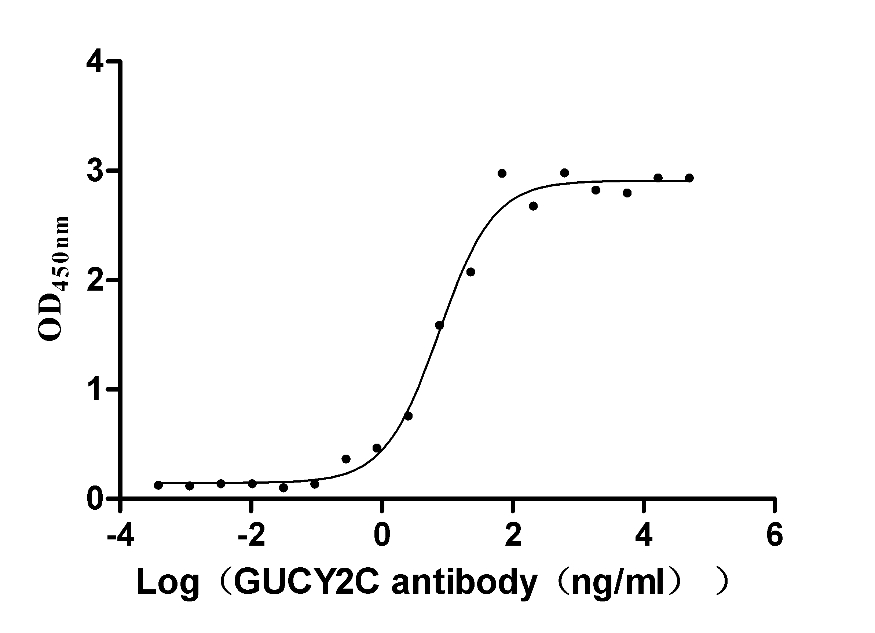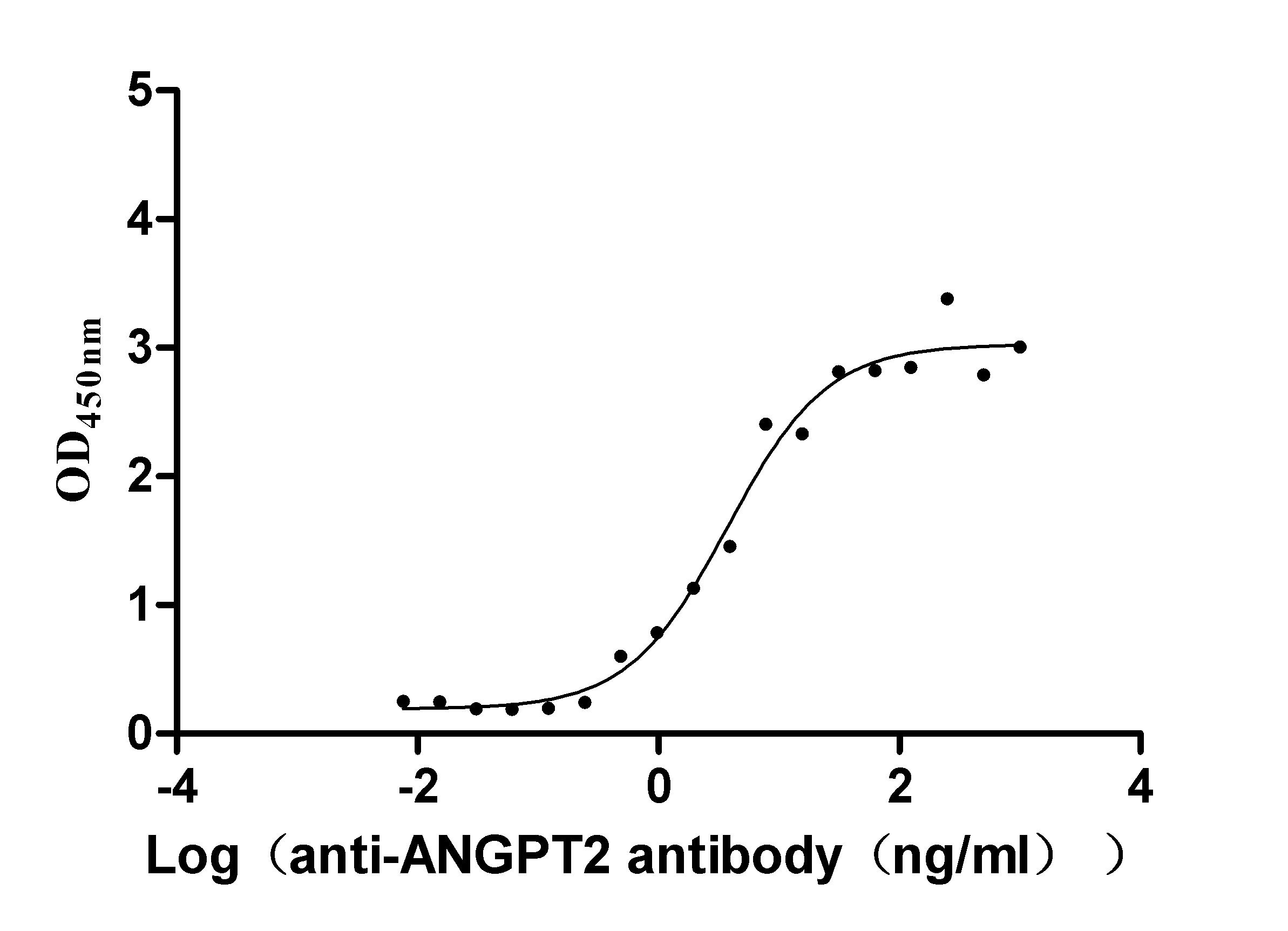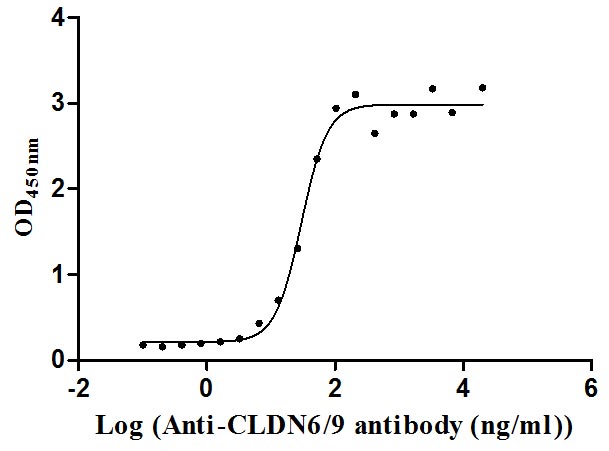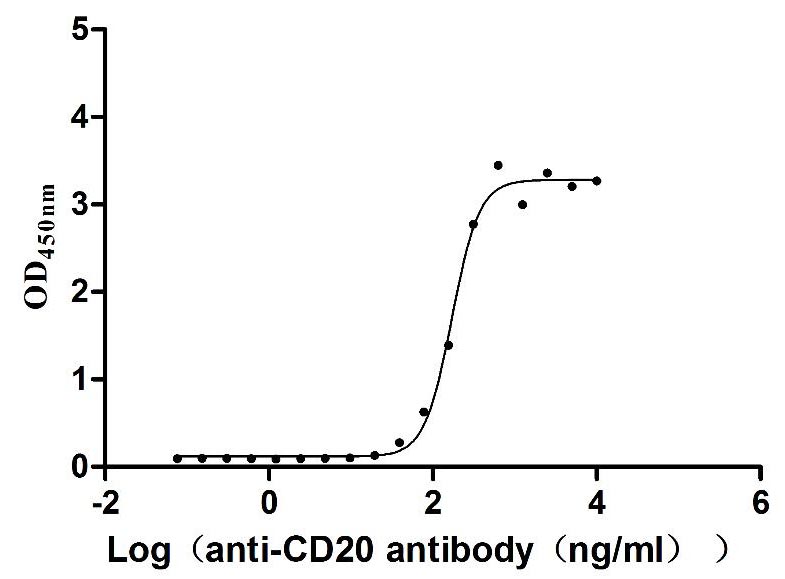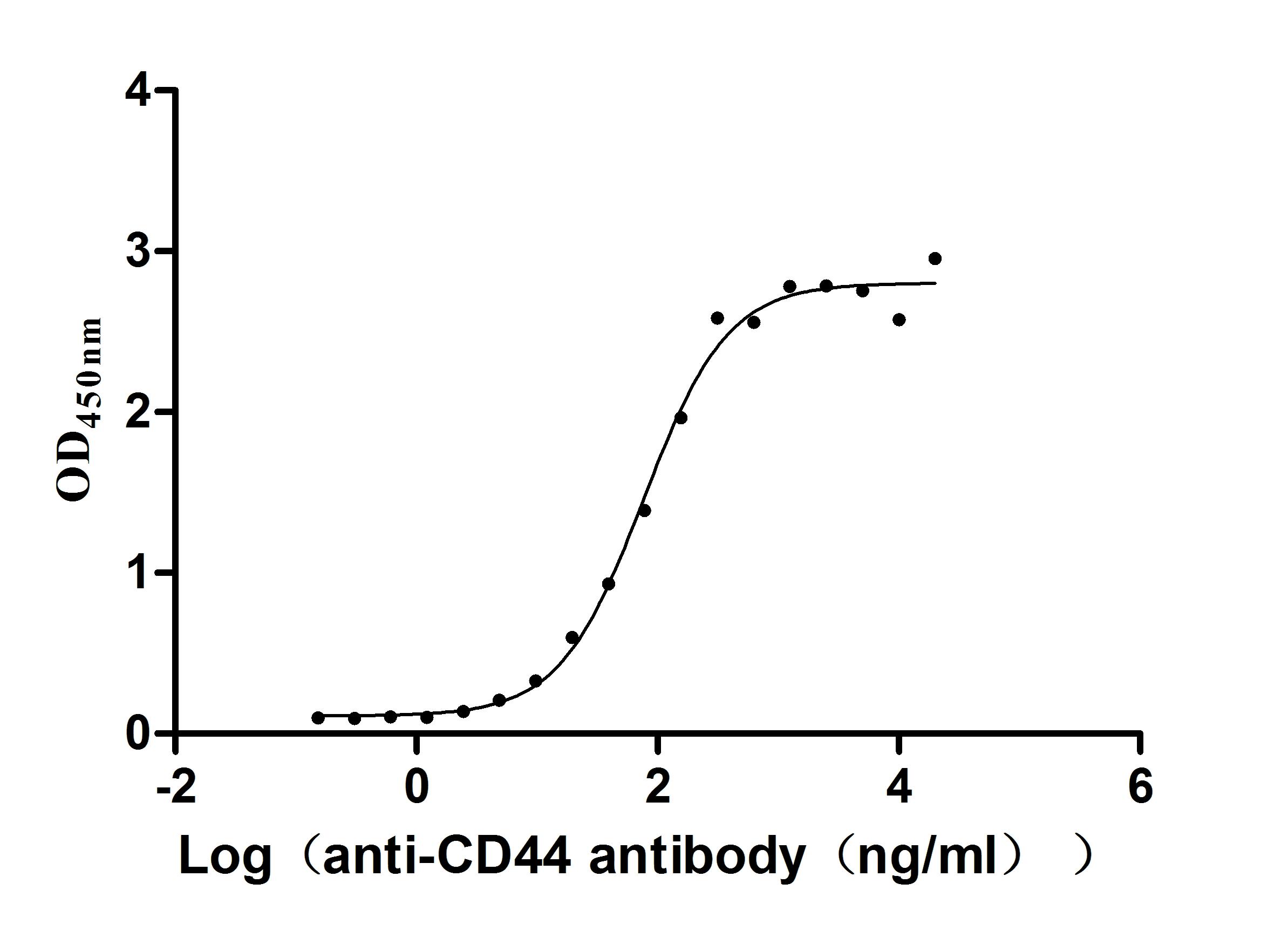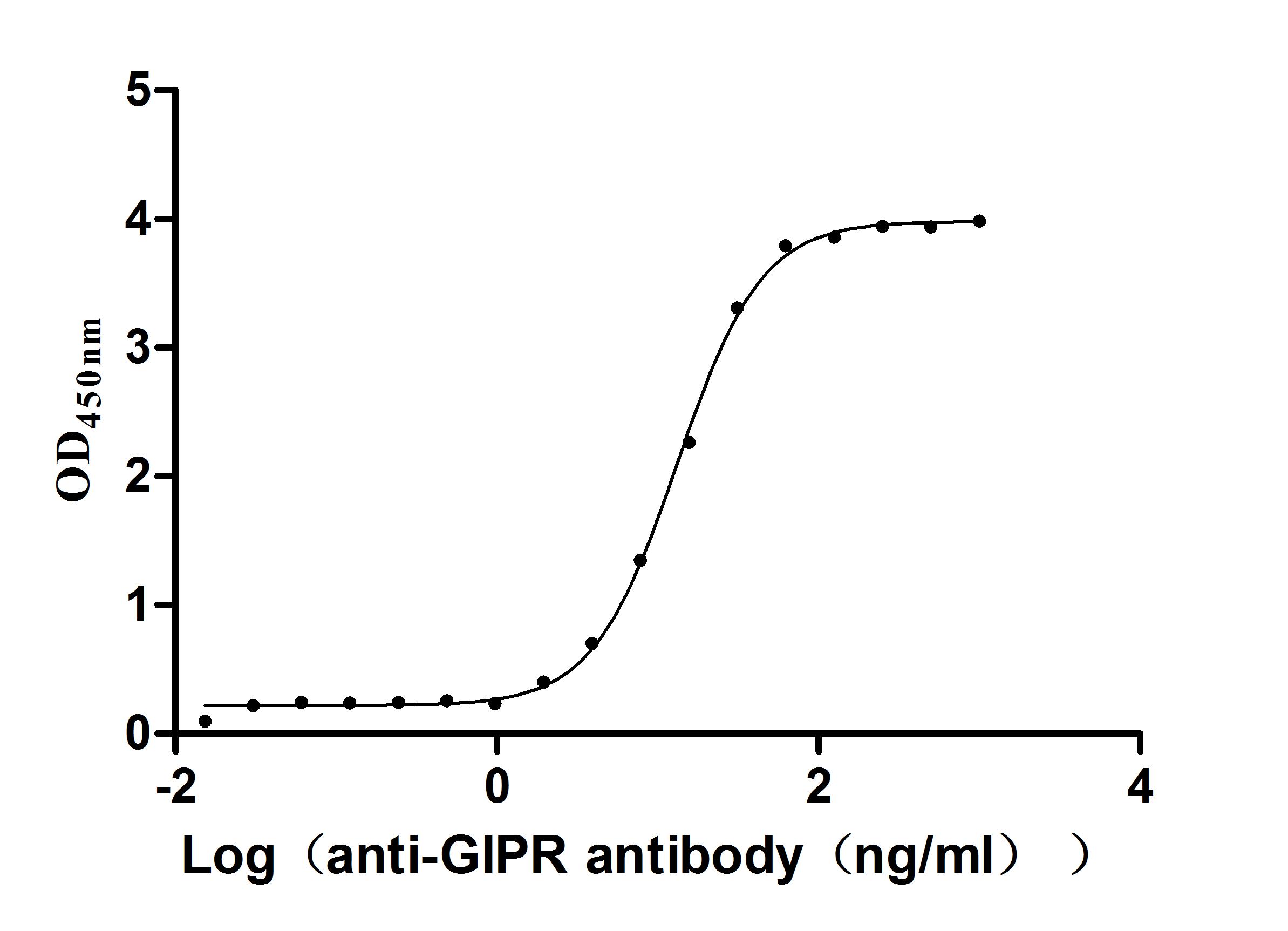Recombinant Human WNT1-inducible-signaling pathway protein 1 (WISP1)
-
货号:CSB-YP026119HU
-
规格:
-
来源:Yeast
-
其他:
-
货号:CSB-EP026119HU
-
规格:
-
来源:E.coli
-
其他:
-
货号:CSB-EP026119HU-B
-
规格:
-
来源:E.coli
-
共轭:Avi-tag Biotinylated
E. coli biotin ligase (BirA) is highly specific in covalently attaching biotin to the 15 amino acid AviTag peptide. This recombinant protein was biotinylated in vivo by AviTag-BirA technology, which method is BriA catalyzes amide linkage between the biotin and the specific lysine of the AviTag.
-
其他:
-
货号:CSB-BP026119HU
-
规格:
-
来源:Baculovirus
-
其他:
-
货号:CSB-MP026119HU
-
规格:
-
来源:Mammalian cell
-
其他:
产品详情
-
纯度:>85% (SDS-PAGE)
-
基因名:
-
Uniprot No.:
-
别名:CCN4; WISP1; CCN family member 4; WNT1-inducible-signaling pathway protein 1; WISP-1; Wnt-1-induced secreted protein
-
种属:Homo sapiens (Human)
-
蛋白长度:Full Length of Mature Protein
-
表达区域:23-367
-
氨基酸序列TALSPAPT TMDFTPAPLE DTSSRPQFCK WPCECPPSPP RCPLGVSLIT DGCECCKMCA QQLGDNCTEA AICDPHRGLY CDYSGDRPRY AIGVCAQVVG VGCVLDGVRY NNGQSFQPNC KYNCTCIDGA VGCTPLCLRV RPPRLWCPHP RRVSIPGHCC EQWVCEDDAK RPRKTAPRDT GAFDAVGEVE AWHRNCIAYT SPWSPCSTSC GLGVSTRISN VNAQCWPEQE SRLCNLRPCD VDIHTLIKAG KKCLAVYQPE ASMNFTLAGC ISTRSYQPKY CGVCMDNRCC IPYKSKTIDV SFQCPDGLGF SRQVLWINAC FCNLSCRNPN DIFADLESYP DFSEIAN
-
蛋白标签:Tag type will be determined during the manufacturing process.
The tag type will be determined during production process. If you have specified tag type, please tell us and we will develop the specified tag preferentially. -
产品提供形式:Lyophilized powder
Note: We will preferentially ship the format that we have in stock, however, if you have any special requirement for the format, please remark your requirement when placing the order, we will prepare according to your demand. -
复溶:We recommend that this vial be briefly centrifuged prior to opening to bring the contents to the bottom. Please reconstitute protein in deionized sterile water to a concentration of 0.1-1.0 mg/mL.We recommend to add 5-50% of glycerol (final concentration) and aliquot for long-term storage at -20℃/-80℃. Our default final concentration of glycerol is 50%. Customers could use it as reference.
-
储存条件:Store at -20°C/-80°C upon receipt, aliquoting is necessary for mutiple use. Avoid repeated freeze-thaw cycles.
-
保质期:The shelf life is related to many factors, storage state, buffer ingredients, storage temperature and the stability of the protein itself.
Generally, the shelf life of liquid form is 6 months at -20°C/-80°C. The shelf life of lyophilized form is 12 months at -20°C/-80°C. -
货期:Delivery time may differ from different purchasing way or location, please kindly consult your local distributors for specific delivery time.Note: All of our proteins are default shipped with normal blue ice packs, if you request to ship with dry ice, please communicate with us in advance and extra fees will be charged.
-
注意事项:Repeated freezing and thawing is not recommended. Store working aliquots at 4°C for up to one week.
-
Datasheet :Please contact us to get it.
相关产品
靶点详情
-
功能:Downstream regulator in the Wnt/Frizzled-signaling pathway. Associated with cell survival. Attenuates p53-mediated apoptosis in response to DNA damage through activation of AKT kinase. Up-regulates the anti-apoptotic Bcl-X(L) protein. Adheres to skin and melanoma fibroblasts. In vitro binding to skin fibroblasts occurs through the proteoglycans, decorin and biglycan.
-
基因功能参考文献:
- Urothelial cell carcinoma carrying WISP1 rs2977530 genetic variants (AG + GG) have a higher risk of developing a more invasive tumor stage and a large tumor. PMID: 29277583
- Study shows that WISP1 expression is significantly upregulated in glioblastoma tissue and cell lines. Also, WISP1 seems to be an important regulator of glioblastoma cell proliferation, apoptosis, migration, invasion, and TMZ drug resistance. WISP1 mediates these biological processes through regulating critical gene expression and pathways that are involved in cancer progression. PMID: 28902353
- WISP1 has a role in colon cancer apoptosis, invasion and poor prognosis PMID: 27409174
- Results indicate that SFRP1 rs7832767 C > T, CTNNB1 rs2293303 C > T, and WISP1 rs16893344 C > T were all strongly correlated with myocardial infarction (MI) susceptibility. PMID: 27391264
- There is a relationship between WISP1 and the metabolic parameters of gestational diabetes (GDM). And, WISP1 might be involved in the pathophysiology of GDM. PMID: 27267804
- Macrophage-derived IL-10 has a role in mediating mucosal repair by epithelial WISP-1 signaling PMID: 28783045
- results demonstrate that a joint effect of WISP1 rs2929970 with smoking as well as WISP1 rs16893344 with betel nut chewing causally contributes to the occurrence of OSCC. WISP1 polymorphism may serve as a marker or a therapeutic target in OSCC PMID: 28426731
- Taken together, our findings presented the first evidence that Wnt1-inducible signaling pathway protein-1 was upregulated in gastric cancer and acted as an oncogene by promoting proliferation, migration, and invasion in gastric cancer cells. PMID: 28618940
- Akt signaling pathway mediates WISP1-induced migration and proliferation of human VSMCs PMID: 27321870
- WISP1 is increased in IBD and contributes to the proinflammatory cascades in the gut. PMID: 27403031
- WISP1-induced IL-6 expression contributes to the pro-proliferative effect on fibroblasts. PMID: 26867691
- WISP1 plays an important role in regulating proliferation and apoptosis of Jurkat cells. PMID: 26823919
- Study showed that DNA methylation of the WISP1 promoter in the majority of the oral squamous cell carcinoma explains its expression regulation. PMID: 26391330
- CCN4 has a positive influence on chondrogenic differentiation by modulating the effects of TGF-beta3. PMID: 26555637
- Its role in tumor progression and clinical outcome makes WISP1 an emerging candidate for the detection and treatment of tumors. [review] PMID: 25794425
- WISP1 contributed to radioresistance primarily by repressing irradiation-induced DNA damage and activating PI3K kinase. PMID: 25749038
- WISP1 functions as an oncogene for human breast cancer. Ectopic expression of WISP1 in breast cancer cells promotes cell growth and metastasis. PMID: 25732125
- WISP1 polymorphisms (rs2929965, rs2929969, rs2929970, rs2929973 and rs754958) were related to the overall platinum-based chemotherapy toxicity of lung cancer in subgroup analyses. PMID: 25405734
- Our data indicate that WISP-1 plays an important role in the development of radioresistance in esophageal cancer cells during fractionated irradiation. PMID: 24728101
- CCN4 activates signalling pathways in osteoarthritis synovial fibroblasts leading to up-regulation of IL-6 production PMID: 23343403
- The data suggest that WISP1 may play a role in linking obesity to inflammation and insulin resistance and could be a novel therapeutic target for obesity. PMID: 25281430
- our findings indicate a regulatory role of miR-92a for WISP1 expression in pulmonary fibrosis. PMID: 24953558
- Wnt5a-induced Wnt1-inducible secreted protein-1 suppresses vascular smooth muscle cell apoptosis induced by oxidative stress. PMID: 25212236
- Data indicate that down-regulation of WNT-induced secreted protein 1 (WISP1/CCN4) in mesenchymal stromal cells resulted in cell death. PMID: 25200494
- WISP-1 enhances the migration of osteosarcoma cells by increasing MMP-2 and MMP-9 expression through the integrin receptor, Ras, Raf-1, MEK, ERK, and NF-kappaB signal transduction pathway. PMID: 24036215
- WISP-1 has a role in invasive breast cancer oncogenesis and reduced type 1 cell-mediated cytotoxic immunity PMID: 24426833
- WISP1/CCN4 expression in prostate cancer tissues was up-regulated in early stages of the disease. PMID: 23977121
- WISP1 is up-regulated by amyloid-beta-protein and can modulate its endogenous expression for the protection of microglia during apoptosis. PMID: 22873724
- Beta-catenin-dependent expression of WISP1 and Cyr61 is critical for epithelial repair. PMID: 23316072
- Prolonged exposure of kidney cells to ochratoxin A, expectable in human kidney due to a normal diet, leads to a marked ERK1/2-dependent upregulation of WISP1 gene expression, which, accompanied by increased ERK1/2- dependent TNF-alpha expression. PMID: 22778029
- CTGF and WISP-1 could play an important role in the progression of primary lung cancers by either individual gene itself or cointeraction. PMID: 19069651
- This study shows that constitutive activation of the Notch1 pathway confers fibroblasts with a suppressive phenotype to melanoma growth, partially through WISP-1. PMID: 21516124
- IL-18 induces signaling events that result in WISP1-mediated saphenous vein smooth muscle proliferation, survival and MMP induction that are key components of vein graft stenosis. This may be amplified by IL-18 and WISP1 autoregulation/cross-regulation. PMID: 21321938
- results indicated that WISP-1 enhances the migration of chondrosarcoma cells by increasing MMP-2 expression through the alpha5beta1 integrin receptor, FAK, MEK, ERK, p65 and NF-kappaB signal transduction pathway PMID: 21453685
- The expression of WISP-1 may play an important role in the progression of esophageal squamous cell carcinoma. PMID: 21498727
- WISP-1 expression in human breast cancer increases significantly and may play a key role in invasion and metastasis. PMID: 20506641
- WISP1 is mainly expressed during organ development and under diseased conditions, such as fibrosis or cancer. PMID: 21109017
- WISP-1 has a positive influence on bone cell differentiation and function and may work by enhancing the effects of BMP-2 PMID: 20684029
- WISP1 inhibits doxorubicin-induced p53 activation, p38 MAPK and JNK phosphorylation, Bax translocation to mitochondria, and cytochrome c release into cytoplasm. PMID: 20074638
- Upregulation of the WISP-1 is associated with lung cancer. PMID: 17579708
- The CCN4/WISP1 was upregulated in the plexiform neurofibromas. PMID: 20010302
- Elevated levels of connective tissue growth factor, WISP-1, and CYR61 in primary breast cancers associated with more advanced features. PMID: 11751417
- Overexpression of WISP1 is associated with breast cancer PMID: 11855747
- overexpression downregulates motility and invasion of lung cancer cells through inhibition of Rac activation PMID: 12529380
- WISP1v-mediated signaling is involved in the generation of invasive cellular properties and leads to progression of cholangiocarcinoma. PMID: 12717393
- Findings indicate that the WISP1v splicing variant plays a critical role in chondrocyte differentiation, whereas the HCS-2/8-specific splicing variant WISP1vx may be associated with the transformed phenotypes of chondrosarcomas. PMID: 17381509
- WISP-1 transcripts were found in lower levels in node-positive tumors compared with node negative tumors;were lower in patients with a moderate and poor Nottingham Prognostic Index prognosis compared with good prognostic groups. PMID: 17406949
- A genetic variation in the WISP1 gene locus is associated with spinal osteoarthritis. PMID: 17593496
- Aberrant levels of WISP-1 expression may play a role in rectal tumorigenesis. WISP-1 may be used as a specific clinical diagnosis and prognosis marker in rectal cancer. PMID: 17657846
- EpCAM is a Wnt-beta-catenin signaling target gene PMID: 18006828
显示更多
收起更多
-
亚细胞定位:Secreted.
-
蛋白家族:CCN family
-
组织特异性:Expressed in heart, kidney, lung, pancreas, placenta, ovary, small intestine and spleen. Isoform 2 is expressed predominantly in scirrhous gastric carcinoma and, weakly in placenta. Overexpression is associated with several cancers including breast cancer
-
数据库链接:
HGNC: 12769
OMIM: 603398
KEGG: hsa:8840
STRING: 9606.ENSP00000250160
UniGene: Hs.492974
Most popular with customers
-
Recombinant Human Tumor necrosis factor receptor superfamily member 5 (CD40), partial (Active)
Express system: Mammalian cell
Species: Homo sapiens (Human)
-
Recombinant Human Pro-neuregulin-1, membrane-bound isoform (NRG1), partial (Active)
Express system: Mammalian cell
Species: Homo sapiens (Human)
-
Recombinant Human Heat-stable enterotoxin receptor (GUCY2C), partial (Active)
Express system: Mammalian cell
Species: Homo sapiens (Human)
-
Recombinant Dog Angiopoietin-2 (ANGPT2) (Active)
Express system: Mammalian cell
Species: Canis lupus familiaris (Dog) (Canis familiaris)
-
Recombinant Human Claudin-9 (CLDN9)-VLPs (Active)
Express system: Mammalian cell
Species: Homo sapiens (Human)
-
Recombinant Dog B-lymphocyte antigen CD20 (MS4A1)-VLPs (Active)
Express system: Mammalian cell
Species: Canis lupus familiaris (Dog) (Canis familiaris)
-
Recombinant Macaca fascicularis CD44 antigen (CD44), partial (Active)
Express system: Mammalian cell
Species: Macaca fascicularis (Crab-eating macaque) (Cynomolgus monkey)
-
Recombinant Macaca Gastric inhibitory polypeptide receptor(GIPR), partial (Active)
Express system: yeast
Species: Macaca fascicularis (Crab-eating macaque) (Cynomolgus monkey)


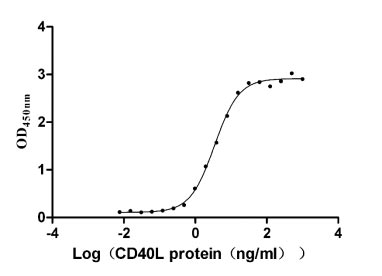
-AC1.jpg)
